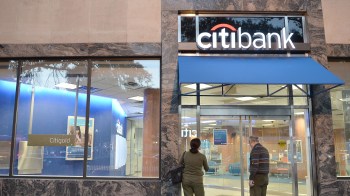Citi claims ignorance on risky investing
TEXT OF STORY
Bob Moon: It was “take the bankers to the woodshed day” again in Washington. On the hot seat this time: Citigroup executives.
Former CEO Charles Prince said he was sorry for errors that forced taxpayers to offer up a $45 billion bailout for Citigroup. Former Citigroup Senior Adviser Robert Rubin didn’t go quite that far.
ROBERT RUBIN: We all bear responsibility for not recognizing this, and I deeply regret that.
At the same time, Rubin insisted that no one brought potential problems on Citi’s balance sheet to his attention. So, more than a year-and-a-half after the financial crisis, where exactly does the buck stop?
Here’s Marketplace’s Jeremy Hobson in New York.
JEREMY HOBSON: Citigroup lost tens of billions of dollars because of its exposure to complex investments in the mortgage market. The idea that a senior adviser was unaware of the risk involved doesn’t make sense to Simon Johnson.
He’s a professor at MIT’s Sloan School of Management and co-author of the new book, “Thirteen Bankers.”
SIMON JOHNSON: I mean, it’s not their job to sit back and enjoy $100 million or whatever it is Mr. Rubin made. Their job is to ask questions, their job is to understand what’s going on, their job is to interact with people on the outside, and to really be tough on management. Clearly that’s not what they were doing.
Johnson calls the failures of executives at all the major banks incompetence at best. But he says…
JOHNSON: I don’t think anybody is capable of controlling these mammoth financial institutions.
Former investment banker Douglas Elliot — now at the Brookings Institution — says the problem was a mindset. Not the actions of any one person.
DOUGLAS ELLIOT: We all got too relaxed, and we started making assumptions like house prices would never go down systematically across the entire country. When you’re working with a viewpoint like that that turns out to be wrong, there are going to be major problems.
He says of course CEOs, risk managers and board members are ultimately responsible for their institutions. But looking for a single scapegoat is futile.
ELLIOT: I’m not saying no one has responsibility, but it’s significant that so many tens of thousands if not, in some senses, millions of people made the same mistake. That says we have to focus on what was driving the mistake, not what did a particular person do.
Elliot says a Wall Street witch hunt, while perhaps emotionally satisfying, won’t help us avoid another crisis.
In New York, I’m Jeremy Hobson for Marketplace.
There’s a lot happening in the world. Through it all, Marketplace is here for you.
You rely on Marketplace to break down the world’s events and tell you how it affects you in a fact-based, approachable way. We rely on your financial support to keep making that possible.
Your donation today powers the independent journalism that you rely on. For just $5/month, you can help sustain Marketplace so we can keep reporting on the things that matter to you.


















